Taking the future one season at a time
Mark McCormack is as accomplished an American cyclist as any in the sport today. Racing since the...
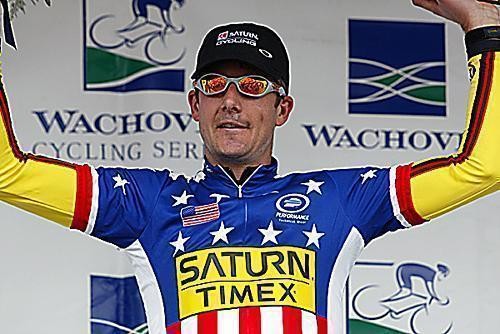
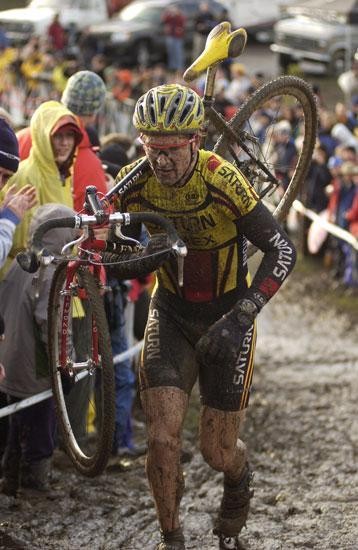
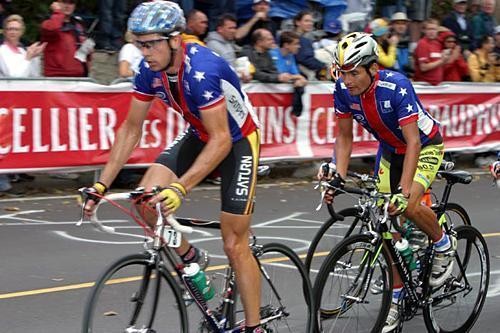
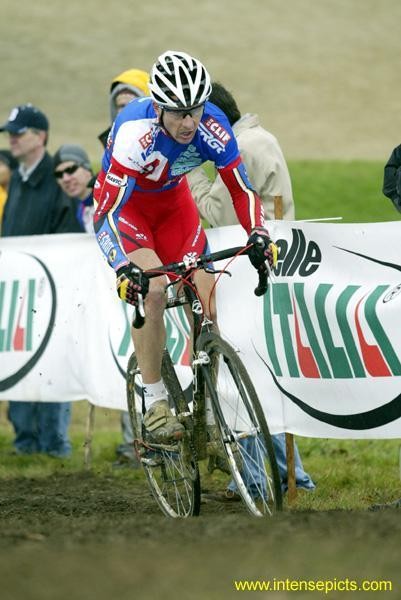
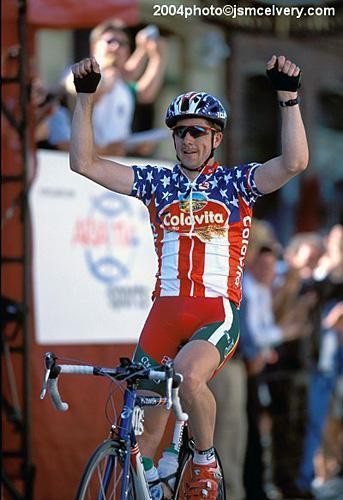
An interview with Mark McCormack, November 14, 2004
Mark McCormack is as accomplished an American cyclist as any in the sport today.
Racing since the mid-eighties, McCormack has become known as a patient, intelligent racer and evolved as a strong team leader of the Colavita Olive Oil team. He's won everything there is to win, from crits and stage races to, ultimately, the 2003 USPRO Championships in Philadelphia, PA. He's competed in or won races as close as in his hometown to as far away as two-days' flying time.
McCormack is also a cyclocross racer. He won cyclocross national championships as both a junior and an Elite. The key to his success, he tells Steve Medcroft, is to focus on three simple principles: set goals, stay focused and keep it fun.
For Mark McCormack, learning to love the fun in cycling came only after a try at a number of traditional sports in his hometown of Plymouth, MA. He played ice hockey at age 4, Little League Baseball from 9 to 12 and youth Football and Basketball in school.
But his love of sport would soon find a mate in cycling. "I've ridden bikes since I was able to walk," he said during a recent exchange from his home in Massachusetts.
"We would ride around my old neighborhood, racing the other kids in the trails we would make in our yards. My dad started taking Frank (Mark's older brother and teammate during an eight-year run with the Saturn Professional Cycling team) and I to BMX races in 1980."
The latest race content, interviews, features, reviews and expert buying guides, direct to your inbox!
After racing BMX for several years until finding road racing, cyclocross and mountain biking as a teenager, McCormack's story begins to find focus.
A talented junior racer, McCormack and brother Frank involved themselves heavily in the Northwest cycling scene. "I started racing in the spring of 1985 as a 14 year-old junior with the Massachusetts Bay Road Club. The owner of our local bike shop, Bill Sykes, was a key mentor for the team. In 1987 the Plymouth/Reebok cycling team expanded and Bill ran a New England division so I was able to race in 1987 and 1988 for P/R."
It would be McCormack's first experience with a more professional approach to team racing. "We were six juniors all on matching bikes and in matching clothing. We met with Reebok executives and took a tour of the Reebok world headquarters and even had a mock race on their property along with Reebok exec's and employees."
In 1989, McCormack turned senior and picked up sponsorship from IME/Panasonic based out of Braintree, MA. "We were an amateur team but were treated like professionals", he said. "We had monthly pay, three bikes each rider, full travel expenses, etc." Also on the team were Graeme Miller and McCormack's brother Frank.
McCormack turned professional in 1992. He was 21 and since he had already won the cyclocross national championships as a junior, he almost immediately started getting attention. His pro career hit a high point when he was signed to the domestic juggernaut Saturn Cycling team. "I learned a lot about business and cycling together during my eight years with Saturn," he says of his experience racing with riders like Steve Bauer, Steve Hegg, Norm Alvis, Bart Bowen, Brian Walton, his brother Frank, Chris Horner and Trent Klasna.
"With time," he says of racing through the Saturn era, "I became stronger physically and tactically." As older riders moved out of the sport, the opportunity opened up for McCormack to take a leadership role. He was immediately humbled by the position. "I never really knew the pressure team leaders were under until I was in that position. Now I know."
Moving on from Saturn
In 2003, although riders on Saturn sensed the sponsorship was in trouble, no announcement had been made about their cancellation of sponsorship. McCormack, now a seasoned veteran with a long history of success, and who had just clinched the USPRO Championships in Philadelphia, was looking at options. "I received a phone call from Albert Wei (an assistant to the Colavita team a few years ago) expressing interest in having me race for the team. But I didn't get a return call so I figured Colavita wasn't interested."
It was a month before he heard anything from the newly forming team. "John Profaci (team general manager) called. I like his vision and we moved forward with forming the remainder of the team. Other riders seemed to be dragging their decision, waiting for Team Sports (Saturn) to make their announcement about shutting down the Saturn team but I didn't need to wait." Colavita built an elite group of riders quickly, adding Ivan Dominguez, Will Frischkorn and Nathan O'Neill.
McCormack had early, measurable success with his new team, starting the year with the Valley of the Sun Stage race in Phoenix, Arizona in February. "We almost won the overall, but our leader that weekend (Nathan O'Neill) had a crash in the final stage that prevented him from finishing," he said.
"From there, the team began to gel. There were so many great talents but, at first, we didn't know exactly what they were and who on the team possessed them. But as the year rolled on, there were so many great victories from lots of different riders. Road races, criteriums, time trials, stage races; we were winning in them all."
Successes included the Tour of Connecticut, Fitchburg Stage Race, and Green Mountain Stage races. But the season had its downs to match the ups. "Philadelphia week and San Francisco were well below my expectations," McCormack said." He finished 14th, trapped in a bunch sprint and unable to find a clean line and the power to defend his jersey.
Your typical New England Cyclocrosser
During his career, and probably due to his proximity to one epicenter of the sport, McCormack has found himself drawn to cyclocross. "I raced 'cross for the first time in 1985. I did it because it was what the people I looked up to did (Paul Curley, Tom Stevens, Frank McCormack)."
He raced the local series at first, "on a Fuji touring bike," he says. He moved on to the national stage and was quick to build a resume to accompany his road wins. "I won junior nationals in my hometown (and at my own high school) in 1988. I went to world's earlier that year after I finished second at nationals in Seattle, WA. I have raced in every nationals (except two) since 1986. I won the elite nationals in 1997 in Colorado after finishing second at least three times prior to that. I won the Saturn Super Cup in 1998 and the New England series many times in the 90s and in 2003."
It might seem that making a transition from one elite season to another is a difficult thing to manage, but McCormack's falls back onto his three principles of cycling (setting goals, staying focused and having fun). "I love to race," he says. "Since I am excited to race, it is easy to stay motivated to train, to set goals, to stay focused."
In 2004, McCormack has been "very close at a few of the national series races," and has hopes for a good finish to the season. "I know I can win. I just need to have a perfect day. And I always set a goal to win nationals again. I have a renewed dedication to 'cross in 2004 and am keeping my goals high for nationals.
The future for Mark McCormack
Mark McCormack loves to be in the thick of racing and cannot see a horizon on which another race isn't waiting for him to win. It's a dedication and focus that will keep him involved in the sport for years into the future, and dedication that has allowed him to share his focus and experience with a select group of other riders.
"I'm coaching now," he says. "I have juniors, masters, women, etc. that I work with and I enjoy seeing my clients succeed at meeting the goals they each set out for themselves."
What he brings to he table, he says, is "a sense of calm. I can help people see things that they haven't considered as reasons for success and failure; help them capitalize on recent success or turn around bad experiences, stay focused on the three main principles of success."
Beyond the challenges of coaching and the rest of the 'cross season, McCormack has 2005 to look forward to as well. Colavita has already locked up a significant roster for next year, with McCormack as a leader. "My brother Frank has been brought on as director as well," he says, "which will help provide another level of leadership. Frank and I have very similar visions for the team and plan to keep Colavita at the top of US racing."
And besides a vision for the team, McCormack finds time to set goals of his own. "2005 is my future. I will focus my attention on racing and training. I would like to once again have a great USPRO road race. I still want to win the USPRO Crit title. I want to continue to enjoy racing and training. I want to be a big part of any successes the Colavita team has during the year."
And if history is a guide, he is certain to do just that.
Other Talking Cycling Interviews
